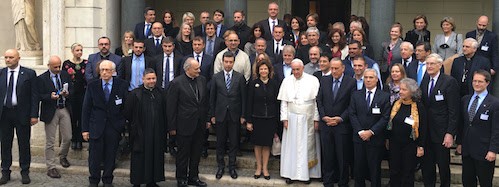Final Statement "Narcotics: Problems and Solutions of this Global Issue," Pontifical Academy of Sciences (PAS)
Source: http://www.pas.va/content/accademia/en/events/2016/narcotics/statement.html

Narcotics: Problems and Solutions of this Global Issue
On November 23 and 24, 2016, the Pontifical Academy of Sciences (PAS) held a meeting at the Vatican with international experts, led and inspired by Pope Francis and Queen Silvia of Sweden, to develop a global view of the current drug epidemic and recommendations to reverse this trend, one that imperils the very elements of civil society: public health, safety and human progress. Millions of victims globally have succumbed to addiction. This is a contemporary version of slavery. It destroys autonomy and free will, a foreseeable outcome of using chemicals that artificially suppress and supplant natural brain reward systems in vulnerable people. Addiction especially threatens young people, as the vast majority of addictions can be traced to initiation during adolescence. This is a period of rapid brain development, with particular risk to the enduring harms of drug use. An essential priority is to protect the brains of children and youth, by discouraging use of all drugs. The international epidemic is led by a globalized network of criminals and legal business interests, with children and youth as their primary targets. They have driven exponential growth of potent forms of cannabis, developed unclean highly addictive cocaine preparations, and created unregulated new psychoactive substances. Prescription drug diversion for non-medical misuse is rooted in different origins, but the risks of medication misuse can be as great or greater than illegal drugs.
We recommend the following actions to be taken:
- Support the three UN treaties governing licit and illicit drugs, which are signed by virtually every nation. These treaties permit medical use of drugs, with tight regulations to prevent diversion for non-medical use and which criminalize the nonmedical sale and use of these same chemicals.
- Governments have a moral and ethical responsibility to secure and defend the common good of their citizens. As trafficking of drugs imperils the health, security and the rule of law in nations, any compromise can be viewed as complicity.
- Governments must unequivocally pursue drug trafficking at every level. They have a responsibility to denounce and criminalize corrupt banks, bankers and money launderers that profit from the drug trade, and thwart large scale and local drug trafficking.
- Governments must not engage in any public, private or covert agreements to gain financial support for political or personal reasons from drug traffickers or industries. Such agreements subvert the common good, trust, health and safety of their people, especially, their youth.
- Instead, governments have a public health, legal and moral responsibility to confiscate the gains of these traffickers/industries and to use these proceeds to fund assistance programs for the victims, which include providing treatment, prevention and medical services, family support, as well as educational and employment opportunities.
- Governments should not use any ill-begotten gains from drug trafficking or sales to generate political messages, regulations or laws that foster use of abusable drugs and subvert public health and safety laws and regulations.
- Reject drug legalization for recreational purposes as a hopeless, mindless strategy that would consign more people, especially the disadvantaged, youth, the poor and the mentally ill, to misery or even death while compromising civil society, social stability, equality, and the law.
- Create a balanced drug strategy, coordinating public health and criminal justice systems to curtail supply, discourage drug use and promote recovery – as a more effective method to treat addiction than incarceration. The primary goal of addiction treatment is long-term care and recovery.
- The foundations of this balanced strategy are fundamental human rights, that include drug prevention and recovery among the world’s diverse faith communities, with a special focus on the goal of protecting youth from drug sales and drug use, in accordance with Article 33 of the Convention on the Rights of the Child.
- The prevention of addiction among youth (less than age 21) is a high priority, and achievable by rejecting the use of marijuana and other rewarding substances.
- The underlying reasons for this priority need to be conveyed to youth and their parents in collaboration with health, educational and local communities.
- Educate the public with up-to-date scientific information on how drugs affect the brain, body and behavior, to clarify why legalization of marijuana and other drugs for recreational use is poor public policy, poor public health policy and poor legal policy.
- Harness religion to support substance abuse prevention and treatment. Drug use can devastate the soul and a loving relationship with God. Drug use in our communities tests our faith. The faithful have a precious opportunity to engage in preventing this tragic form of modern chemical slavery. For those now enslaved, they can confront the challenge of addiction and achieve their emancipation.
- ISSUP members can join Networks to comment – Sign in or become a member